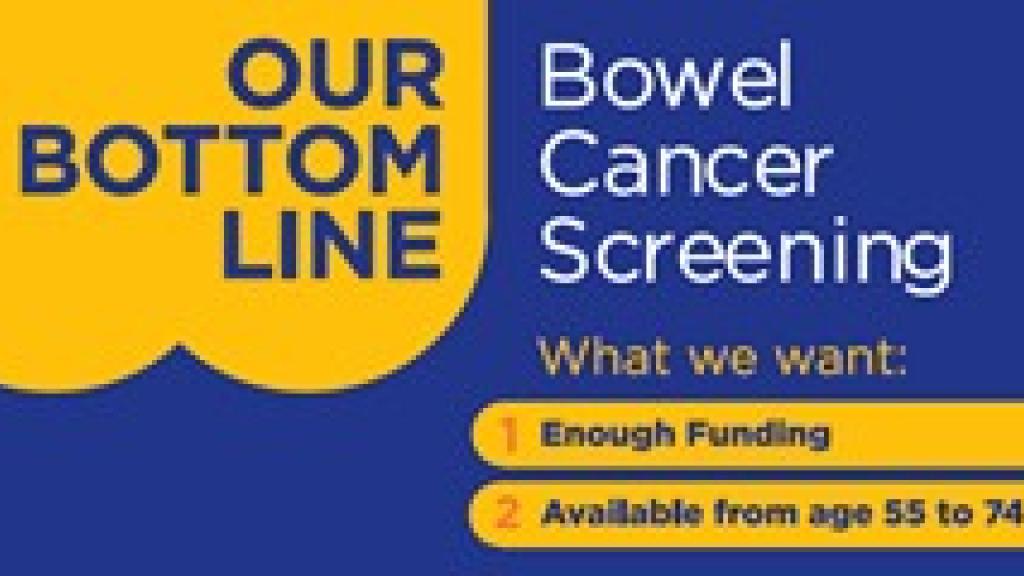
Irish Cancer Society launches "Our Bottom Line" Bowel Cancer Screening Advocacy Campaign
Society wants the Government to ensure that screening is available to all who need it
The Irish Cancer Society today launched a campaign calling on the Government to meet Our Bottom Line on bowel cancer screening by making screening available to all who need it. The Society wants the age for bowel cancer screening to be extended and long-term funding for the programme to be put in place. A national bowel cancer screening programme implemented by the National Cancer Screening Service is due to begin by the end of the year with screening initially being offered to men and women aged 60 to 69 years of age. Bowel cancer is the second biggest cancer killer in Ireland for both men and women, with over 900 deaths each year. There are over 2,000 new cases of bowel cancer in Ireland each year. The number of people diagnosed with bowel cancer is expected to increase as our population ages and by 2020, 3,755 people a year are expected to be diagnosed with bowel cancer. The Irish Cancer Society has been calling for a bowel cancer screening programme for many years. Kathleen O’Meara, Head of Advocacy and Communications with the Society, said, “We very much welcome the programme which is due to begin this year but we are concerned that it will initially only be available to people aged 60 to 69 years of age. Screening needs to be offered to all people aged 55 to 74 years of age as bowel cancer is most commonly diagnosed in this group. Screening should be introduced on a national basis to the full age group and not on a phased basis as is planned. Long-term funding for the programme must be secure. We are operating in an increasingly difficult economic environment and we are seeking assurances that funding will be secured to sustain the programme.” Significant per cent reduction in bowel cancer deaths Screening gives people the best possible chance of survival by detecting bowel cancer at an early and treatable stage. Research in Scotland, where a screening programme is in place, has found that bowel cancer deaths were cut by 27 per cent among those who had attended screening compared with those who did not*. Screening is used to detect bowel cancer in people who have no symptoms. Screening detects bowel cancer when it is at a curable stage. Screening also detects pre-malignant lesions which can be removed, preventing bowel cancer from developing. Bowel cancer screening means that fewer people develop the disease in the first place, that some of those who do can get treated successfully, and that fewer people will die from bowel cancer. Pilot bowel cancer screening programme Professor Colm Ó’Moráin, Emeritus Dean of Health Sciences at Trinity College Dublin, said, “Bowel cancer is the second most common cause of cancer death in Ireland. One of the reasons for this is that more than half of people with bowel cancer are diagnosed in the later stages of the disease which means that they require more complex treatment and have a poorer chance of survival. The good news is that bowel cancer is treatable if caught in time. A national screening programme is the key to improving early detection and survival from bowel cancer. Bowel cancer screening has the potential to become one of the most valuable and beneficial public health services in Ireland.” Professor Ó’Moráin was the lead clinician for the bowel cancer screening programme which was piloted by Tallaght Hospital and Trinity College Dublin in the Tallaght area. The study found that 10% of people who participated in the pilot tested positive for symptoms of bowel cancer and of that 10% approximately 30% could be treated for early bowel cancer. The Society strongly encourages those concerned about bowel cancer to call the Irish Cancer Society’s National Cancer Helpline on Freefone 1800 200 700, or to visit their GP. Through the National Cancer Helpline we support patients and their families at every stage of their cancer journey and anyone with any concerns can ring in confidence and speak to a specialist nurse. The Society is asking members of the public to let their TDs know about the importance of bowel cancer screening by sending an email to their local TD through www.cancer.ie/ourbottomline. *Gillian, L – The impact of population-based faecal occult blood screening on colorectal cancer mortality: A matched cohort study, 2011. View the conference abstract here.
